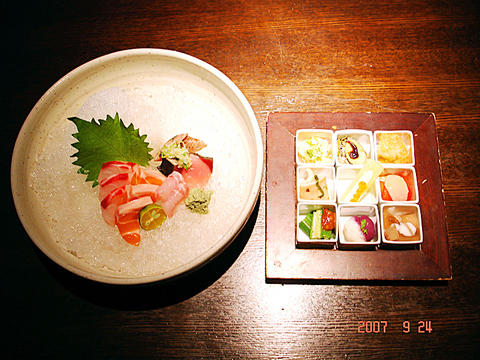Right in the heart of Taipei's fashionable Anhe Road, Shintori (新都里) is an upscale Japanese restaurant aimed at well-to-do customers with discernable tastes.
To attract customers, the restaurant spares no expense in fashioning its space with a highbrow gallery design that features granite walls and flooring and subtle lighting. The establishment has 132 seats in its public dinning area, 12 seats at the bar and 86 seats in 14 private dinning booths.
As a brand-name restaurant that targets young professionals, the joint specializes in nouveau Japanese food that blends traditional ingredients with innovative cooking techniques.

PHOTO: ANDREW HUANG, TAIPEI TIMES
For any Japanese food lover, Shintori's assorted sashimi (綜合生魚片) is a must-try. The ultra-fresh, melt-in-your-mouth pieces of fish come on a carpet of ice to preserve the fish's freshness during its journey from kitchen to table.
The rock 'n' roll salad (搖滾沙拉) is named after its serving method. The dish is brought in by the waiter who pours the house dressing into a tall glass cylinder, adds the salad and then rocks and shakes the mixture, after which it is served in a wooden bowl. The ginger dressing is also one-of-a-kind and delivers just the right savory tinge to the salad dish.
Also highly recommended is the appetizer dish cubic appetizer (九宮前菜), which consists of nine ceramic cubes containing different appetizers chosen by the chef from the day's freshest ingredients.
As a nouveau-Japanese food joint, some of the restaurant's innovative dishes are bound to backfire. Shintori's seafood rice pizza (米飯披薩) is beautiful and the idea seems tantalizing, but it tastes like it came from a fast food store.
The service is impeccable as the waiters are extremely attentive in delivering and serving the food. When the water line in your teacup dips, the house policy is to replace it with a brand new cup of tea rather than refilling the old cup. This keeps the tea at just the right temperature and is just the attitude that discerning diners appreciate.

April 14 to April 20 In March 1947, Sising Katadrepan urged the government to drop the “high mountain people” (高山族) designation for Indigenous Taiwanese and refer to them as “Taiwan people” (台灣族). He considered the term derogatory, arguing that it made them sound like animals. The Taiwan Provincial Government agreed to stop using the term, stating that Indigenous Taiwanese suffered all sorts of discrimination and oppression under the Japanese and were forced to live in the mountains as outsiders to society. Now, under the new regime, they would be seen as equals, thus they should be henceforth

Last week, the the National Immigration Agency (NIA) told the legislature that more than 10,000 naturalized Taiwanese citizens from the People’s Republic of China (PRC) risked having their citizenship revoked if they failed to provide proof that they had renounced their Chinese household registration within the next three months. Renunciation is required under the Act Governing Relations Between the People of the Taiwan Area and the Mainland Area (臺灣地區與大陸地區人民關係條例), as amended in 2004, though it was only a legal requirement after 2000. Prior to that, it had been only an administrative requirement since the Nationality Act (國籍法) was established in

Three big changes have transformed the landscape of Taiwan’s local patronage factions: Increasing Democratic Progressive Party (DPP) involvement, rising new factions and the Chinese Nationalist Party’s (KMT) significantly weakened control. GREEN FACTIONS It is said that “south of the Zhuoshui River (濁水溪), there is no blue-green divide,” meaning that from Yunlin County south there is no difference between KMT and DPP politicians. This is not always true, but there is more than a grain of truth to it. Traditionally, DPP factions are viewed as national entities, with their primary function to secure plum positions in the party and government. This is not unusual

US President Donald Trump’s bid to take back control of the Panama Canal has put his counterpart Jose Raul Mulino in a difficult position and revived fears in the Central American country that US military bases will return. After Trump vowed to reclaim the interoceanic waterway from Chinese influence, US Defense Secretary Pete Hegseth signed an agreement with the Mulino administration last week for the US to deploy troops in areas adjacent to the canal. For more than two decades, after handing over control of the strategically vital waterway to Panama in 1999 and dismantling the bases that protected it, Washington has